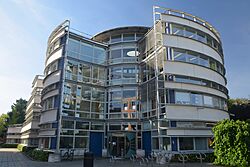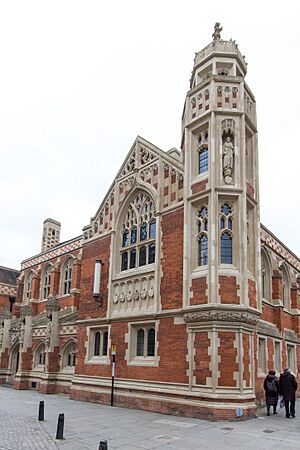Faculty of Divinity, University of Cambridge facts for kids

Faculty of Divinity building on the Sidgwick Site
|
|
| Type | Divinity |
|---|---|
|
Parent institution
|
University of Cambridge |
| Location | , , |
The Cambridge Faculty of Divinity is a special school at the University of Cambridge. It focuses on the study of religion, especially Christianity. This faculty also has its own large library, which is full of books and resources for students.
Contents
History of Divinity Studies
The study of religion, or divinity, has been taught at the University of Cambridge for a very long time. It started when the university itself began in the early 1200s. This makes it one of only two subjects that have been taught continuously for over 800 years at Cambridge.
In 1502, the first special teaching job, called a professorship, was created for divinity. It was named the Lady Margaret's Professor of Divinity. Later, in 1540, other important professorships were added, including the Regius Professor of Divinity.
From 1879, the Faculty of Divinity was located in a building called the Selwyn Divinity School. This building is now known as The Old Divinity School and belongs to St John's College. Since 2001, the faculty has been in a new building on the university's Sidgwick Site, which is in the western part of Cambridge.
Special Teaching Jobs
Since the 1500s, the University of Cambridge has created many special teaching jobs, known as professorships. Divinity was one of the very first subjects to have these important positions. These jobs are held by expert teachers and researchers.
Here are some of the main professorships in the Faculty of Divinity:
- Lady Margaret's Professor of Divinity (started in 1502)
- Regius Professor of Divinity (started in 1540)
- Norris-Hulse Professor of Divinity (created in 1777, combining two older professorships)
- Ely Professor of Divinity (started in 1889)
What Students Learn
The Faculty of Divinity works with the Cambridge Theological Federation. This means it trains not only university students but also people who are preparing to become religious leaders, like priests or ministers.
The main degree for students now is called "Theological and Religious Studies." This name shows that students learn about many different religions and beliefs, not just one.
Areas of Study
Students and researchers at the Faculty of Divinity explore many interesting topics. Here are some of the main areas they study:
- The Old Testament (part of the Bible)
- The New Testament (part of the Bible)
- Christian Theology (the study of Christian beliefs)
- The History of Christianity
- The Philosophy of Religion (thinking about big questions about religion)
- Religious Studies (learning about different religions)
- Ancient times (late antiquity)
- Hebrew, Jewish, and Early Christian studies
- Christianity around the world
- Languages used in religious texts
Special Lectures
Since 1820, the Faculty of Divinity has hosted special talks called "named lectures." These lectures are given by important scholars and cover many interesting topics. Some of these lecture series include:
- Hulsean Lectures
- Jeremie Lecture
- Stanton Lectures
- Tyrwhitt Lecture
- Yerushah Lecture
Global Reputation
For many centuries, the Faculty of Divinity at Cambridge has been a very important place for studying religion. It is well-known not only in the United Kingdom but also around the world. The Faculty of Theology and Religion at the University of Oxford is another famous place for these studies.
In recent years, university rankings have become more important. The Faculty of Divinity continues to have a high international standing. In 2019, the QS World University Rankings placed the University of Cambridge 6th worldwide for this subject. In the UK, the faculty was ranked 1st by the Complete University Guide (2018) and by The Guardian (2018).
Important Scholars
Many famous and important teachers and scholars have been part of the Faculty of Divinity. They have helped shape how we understand religion and history.
-
Richard Bentley was a famous classical scholar and theologian.
-
Erasmus was a very influential scholar from the past.





